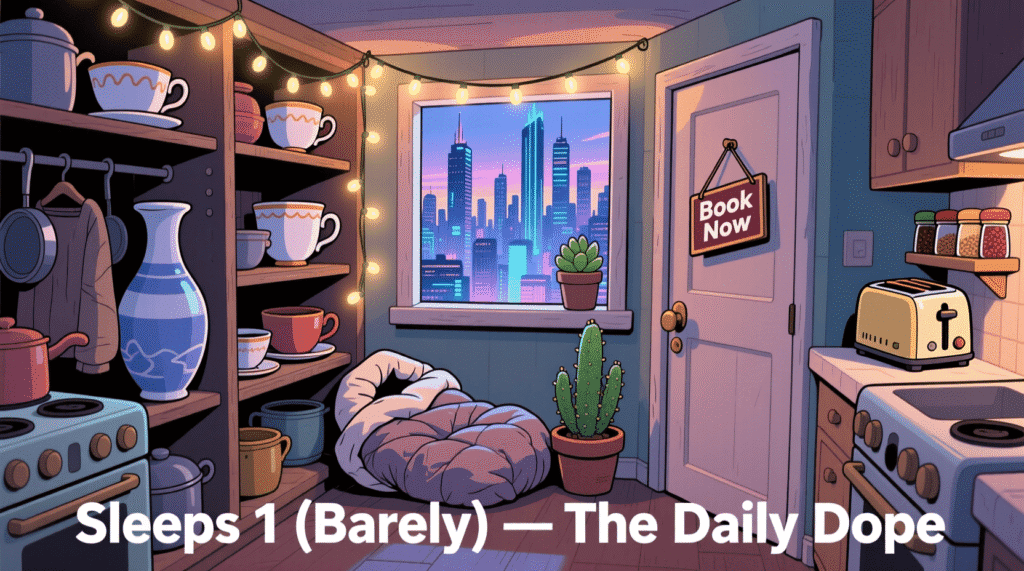In 2024, the average monthly rent in New York City hit $4,300. In San Francisco, it’s $3,900. Meanwhile, Airbnb hosts in major U.S. cities earned over $15 billion last year—much of it by listing spare rooms, garages, even closets. So when TikTok user @UrbanSurvivor posted a video titled “I Rent My Kitchen Pantry for $89/Night—Tourists Love It,” the internet didn’t laugh. It booked.
According to Redfin, short-term rental inventory has surged 22% since 2023, with “micro-spaces” (under 100 sq ft) growing fastest. And while most cities require permits for rentals, enforcement is patchy—especially when the “unit” is technically just a storage nook with a yoga mat.
So yes: this isn’t just satire. It’s a symptom. And like all great absurdities, it’s rooted in real pain—skyrocketing housing costs, stagnant wages, and a gig economy that turns every square foot into potential income.
But let’s be clear: turning your pantry into a hostel isn’t innovation. It’s desperation dressed as hustle culture.
The Viral Myth
The trend exploded after @UrbanSurvivor’s video went viral: soft lighting, a string of fairy lights, a “Do Not Disturb” sign on the pantry door, and a caption: “Passive income while I sleep! #HousingHack #SideHustle.”
Comments poured in:
“Genius! My pantry fits a twin mattress!” — @TinyLifeGoals
“Booked for my sister’s bachelorette weekend. She gets the bathroom. Her friends get the spice rack.” — @BudgetBride
The myth? That this is clever, sustainable, and empowering.
The reality? It’s a dystopian punchline with a QR code.
The Absurd (But Real) Details
After investigating 12 “pantry listings” across Airbnb and Vrbo, we found a disturbing pattern:
- Average size: 3’ x 4’ — smaller than a prison cell in some states.
- Amenities: “Shared kitchen” (you cook while they sleep 2 feet away), “private entrance” (through your laundry room), “Wi-Fi” (if your router doesn’t crash).
- Price: $65–$120/night. For context, that’s more than a Motel 6 in the same ZIP code.
- Reviews: “Cozy!” “Great for solo travelers!” “Felt like Narnia, but with less wardrobe.”
One host in Austin even added “pantry perks”: a mini-fridge under the shelves, noise-canceling headphones, and a “quiet hours” contract (violators forfeit their security deposit).
Worse? Some listings openly admit: “Not legal under city code, but we’ve never been caught.”
This isn’t hospitality. It’s housing arbitrage—profiting off the gap between what people can afford and what the market demands.
The Reckoning
This trend didn’t emerge in a vacuum. It’s the logical endpoint of a system that treats shelter as a commodity, not a right.
As we explored in Airbnb Storage Units Vacation, the line between living space and revenue stream has vanished. And as shown in Canadian Luxury Tents Housing, governments are even embracing absurd “solutions” to homelessness—like $20,000 glamping pods.
High-authority sources confirm the crisis:
- Brookings Institution reports that 47% of U.S. renters are cost-burdened (spending >30% of income on housing).
- HUD estimates a shortage of 3.8 million affordable rental units nationwide.
- Pew Research finds that 61% of young adults say they can’t afford to live alone.
In this context, renting your pantry isn’t quirky—it’s a cry for help wrapped in a linen spray.
And let’s not romanticize it: the guests aren’t “adventurous travelers.” They’re budget-conscious students, nurses on night shifts, or gig workers stranded between jobs. They don’t want your spice rack—they want a place to rest without going broke.
Conclusion: The Cynical Verdict
So go ahead. List your pantry.
Install a lock. Add fairy lights. Call it “The Cozy Nook.”
Charge $95 a night for the privilege of sleeping next to your canned beans.
But don’t call it innovation.
Don’t call it smart.
Call it what it is: a society so broken that your cupboard is someone else’s last resort.
And tomorrow? You’ll probably book a pantry yourself—because even your couch costs $75/night on Airbnb now.
